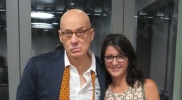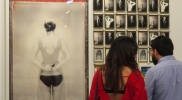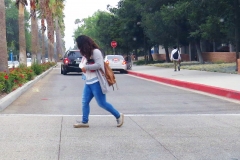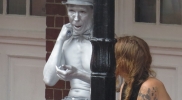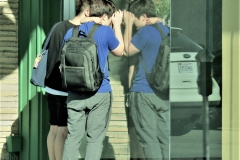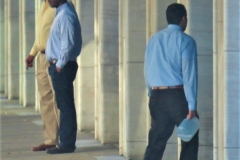|
|
Best Trivia - Religion
Favorite Trivia – RELIGION & FAITH & RUMOR
|
|
“The words Faith and Religion are often used interchangeably, but there is a real difference in distinction. Religion requires Faith, but Faith does not require Religion.”
|
| religion: “Man’s search for some assurance that he won’t be dead when he will be.”
Leonard Louis Levinson – Webster’s Unafraid Dictionary: 5,000 Defiant Definitive Put-Downs
|
| “The worse a man is used in this world, the more likely he is to lean on, and love and hope in his Creator.”
Benjamin Robert Haydon (journals)
|
| “Updating Epictetus for the age of enlightenment, [Alexander] Pope argued that life only seems cruel and capricious because we’re blind to the grand scheme of things. Therefore, we should grin and bear whatever befalls us knowing that, ultimately, it’s not up to us and will, eventually, turn out for the best.”
Geary – The World in a Phrase: A Brief History of the Aphorism
|
| “If God wanted us to bend over, he’d put diamonds on the floor.”
Joan Rivers (That’s Really Funny)
|
| “After all, it is no more surprising to me to be born twice than it is to be born once.”
Voltaire
|
| “The ‘dirty thirties’ as the Scientologists call them. Don’t know why. What the hell is auditing? Listening to trauma and passing it on. Here is one revolting process: look at someone on the street, and imagine everything that is wrong with you is wrong with him or her. (Unburden that whole load of shit on some passerby. May encounter a tough one, catches on straightaway and throws it back with intent and interest.) . . . There is no doubt about it: Scientology is evil and basically ill-intentioned and nasty.”
William S. Burroughs – Last Words: The Final Words of William S. Burroughs
|
| “If God had wanted me otherwise, he would have created me otherwise.”
Johann Wolfgang von Goethe
|
| “God can’t be always everywhere: and, so, Invented Mothers.”
Mothers – Sir Edwin Arnold
|
|
“Prayer must never be answered: if it is, it ceases to be prayer and becomes a correspondence.”
Oscar Wilde (Christopher Morley’s Book of Days for 1931 [February 25])
|
| “Emotional equanimity is a Buddhist virtue, a reflection of one’s ability to accept reality and a sign that one is not contributing to the heat of suffering in the world by resisting that reality.
Sallie Tisdale – “The Sutra Of Maggots and Blowflies” (The Inevitable: Contemporary Writers Confront Death, ed. by David Shields and Bradford Morrow)
|
| “If men are so wicked (as we see them now) with religion, what would they be if without it?”
Benjamin Franklin
|
| “Do you think God gets stoned? I think so . . . look at the platypus.”
Robin Williams (That’s Really Funny)
|
|
“Ordinary religion maintains its equilibrium, so far as it does so, because of its low potential. But an intensely religious person is bound to come into conflict with religion itself. Very religious people always shock slightly religious people by their blasphemous attitude to religion; and it was precisely for blasphemy that Jesus was crucified.”
R. G. Collingwood, Speculum Mentis (Christopher Morley’s Book of Days for 1931 [September 16])
|
| God: “The John Doe of religion.”
Evan Esar – Esar’s Comic Dictionary
|
| “For centuries the church had taught that fallen mankind had no right to be happy. This was not our role on earth. Our purpose was to suffer, as the savoir had suffered for us. The Aristocratic elite also would have laughed at the idea that mere ordinary people should aim to be happy. Ordinary people were quite obviously placed on Earth to work. Let the majority of people aim for their own happiness and the system could collapse.”
David Bodanis – Passionate Minds
|
| “‘Evangelicals are losing their young in epidemic numbers,’ said David Gushee, a nationally known pastor, ethicist and author of After Evangelicalism: A Path to a New Christianity. ‘Smart, young minds rarely color within the lines, and if they can’t ask questions and get decent answers, they will bail.'”
The Los Angeles Times, June 12, 2022
|
| “On no day can anyone say for sure what he’ll be doing that evening.”
Mikail Bulgakov (play: van Itallie; trans. Kobiakoff) – Master & Margarita
|
| “I hope I never get so old I get religious.”
David Baird – A Thousand Paths to Long Life
|
| “Nietzsche never even tried to create a logically coherent body of thought. His sole aim was to expose and decry the flimsy illusions and self-serving delusions he believed ruled most people’s lives. His main target was Christianity, which he said stunted spiritual growth by imposing moral straightjackets and suffocating doctrines on its followers.”
Geary – The World in a Phrase: A Brief History of the Aphorism
|
| “If Jesus was a Jew, how come he has a Mexican first name?
Billy Connolly (That’s Really Funny)
|
| “Once a year, on a changing day in April, people in Bali celebrate Nyepi (in-YEH-pee), a national day of silence that follows the dark moon of the Spring Equinox and ushers in the Balinese New Year. On this Hindu holiday, both car and foot traffic are prohibited (except for emergency vehicles) . . . work, socializing, and even lovemaking stops, as a nation sits and falls silent together, for one day of introspection in an otherwise hectic year . . . During Nyepi, surrounded by the incense of wildflowers, one mulls over values, beholds the balance of nature, meditates on love, compassion, kindness, patience.”
Diane Ackerman – “Silence And Awakening” (The Inevitable: Contemporary Writers Confront Death, ed. by David Shields and Bradford Morrow)
|
| “‘As you get older and older, you think, come on, this is ridiculous—do you really think there’s going to be something after you go? Do you really think there’s something waiting for you, heaven or hell? Come on. Let’s face it. I’ve led a Christian life, don’t get me wrong, but now it’s getting to the end of time and I just know. I just know. I will go through the ceremonies but I would be very surprised if there’s something waiting for me.'” [Granny D]
Henry Alford – How To Live: A Search for Wisdom from Old People
|
| “What God, what Christ? They were myths I once believed, and now they were beliefs I felt were myths.”
John Fantes – Ask The Dust
|
| “Meanwhile, where is God? This is one of the most disquieting symptoms. When you are happy, so happy that you have no sense of needing HIM, so happy that you are tempted to feel His claims upon you as an interruption, if you remember yourself and turn to HIM with gratitude and praise, you will be—or so it feels—welcomed with open arms. But go to Him when your need is desperate, when all other help is vain, and what do you find? A door slammed in your face, and a sound of bolting and double bolting on the inside. After that, silence. You may as well turn away. The longer you wait, the more emphatic the silence will become . . . Why is He so present a commander in our time of prosperity and so very absent a help in time of trouble?”
C.S. Lewis – A Grief Observed
|
| “It’s not for me—religion. It seems like a redundancy for a poet.”
May Swenson
|
| “Gott macht gesund, und der Doktor bekommt das Geld”: “God makes us well, and the doctor gets the money.”
Proverb
|
“I am just as certain as you see me here that I have existed a thousand times before, and I hope to return a thousand times more.”
Goethe
|
| Buddhism’s “second death”: When everyone who knows the deceased has died.
Lynne Tillman – “The Final Plot” (The Inevitable: Contemporary Writers Confront Death, ed. by David Shields and Bradford Morrow)
|
| “Day 82. Ecclesiastes is probably my favorite book of the Bible. I first read about it in the Encyclopaedia Britannica, and I have loved it ever since. Called Qohelet in Hebrew, the book is a collection of wisdom and reminiscences from a man who identifies himself as King Solomon . . . Ecclesiastes says that life is uncertain . . . We can never hope to plumb the mystery of God’s mind. Bad things happen to good people. Idiots and geniuses, saints and sinners—we all die. The best we can do is try to appreciate the greater things that God has given us—food, drink, the pleasure of honest work. We should follow the commandments, but we should do so with no guarantee that they will pay off in this life.” [November 21, 2005]
A. J. Jacobs – The Year of Living Biblically
|
| “One glance at this island [Atuana] and I doubted the historians who placed the Garden of Eden in Arabia or Mesopotamia. Beautiful cocoanut palms—thousands of them—covered hill and dale. Sometimes, I thought, their shadows were more beautiful than themselves.”
Maude Parrish – Nine Pounds of Luggage
|
|
The transformation of water into wine at the Wedding at Cana is the first miracle attributed to Jesus in the Gospel of John.
|
| “Wouldn’t it make more sense if a priest, instead of asking you to say three Hail Mary’s, two Our Father’s and one Glory Be at confession as pardon for your sins, asked you to say: three Pardon Moi’s, two I’m Sorry’s, and one Mea Culpa?”
Patty Martino Alspaugh
|
|
“Summing up, we may predict the immediate future somewhat as follows: Coming into contact with the increased facilities for freedom of action, the new itch to regulate men’s lives will lead to persecution and heresy-hunting. The growth of Puritanism will bring a growth in hypocrisy, a fruitful and invaluable offshoot of Puritanism. There will be an even greater disparity between men’s practices and their professions than there is at present. Th world, in short, will become a paradise for the average man and a hell for the exceptional one. So much we may expect during the next fifty years .”
C.E.M. Joad, Thrasymachus, or The Future of Morals, 1926 (Christopher Morley’s Book of Days for 1931 [March 23])
|
| Chelsea Handler asks Neil DeGrasse Tyson: “As a Scientist do you believe in God?”:
“. . . Every description of God that I’ve heard holds God to be all powerful and all good. And then I look around I see a tsunami that killed a quarter million people in Indonesia, an earthquake that killed a quarter million people in Haiti, and I see earthquakes, tornadoes, and disease and childhood leukemia. I see all this and I don’t see evidence of both of those being true simultaneously. If there is a god, the god is either not all powerful or not all good. He can’t be both. If you have good evidence I’m good for it. I am more evidence-driven, than faith-driven.” |
|
hell: “A place where the French are the engineers, the British are the cooks, the Germans are the police, the Russians are the historians and the Americans are the lovers.” – Anonymous (Japanese)
Webster’s Unafraid Dictionary: Defiant Definitive Put-Downs – Leonard Louis Levinson
|
| “The women of Turkey had to be heavily veiled before going on the street until fairly recently. No man could see their faces. They drifted along like black ghosts through the dusty alleys. The better class women would have a big black eunuch for a guard. Now the rank and file of women are very loud mouthed and should be muzzled. They seem forever trying to attract attention to themselves, so jubilant, or self-conscious is their new freedom . . . “It’s all up to date now [Turkey], with representatives to rule, a modern army and all. They even have an up to date fire department. Before it was men running with a hose. I’ll never forget seeing the firemen stop to argue, put down the hose, and begin to fight each other, while the building burned.”
Maude Parrish – Nine Pounds of Luggage
|
| “A long dreary wait at London airport in which fret, frenzy and dismay reigned. The human race in bulk leaves one in grave doubt as to the possibility of a creator.”
Edna O’Brien
|
| “I am an atheist, thank God!”
Anonymous
|
| “Jerusalem had a curfew law. City of religion and trouble. It’s all very beautiful, that thrice holy city—Christian, Jew, and Moslem. The Mosque of Omar is supposed to be on the site of the original King Solomon’s temple, and so is one of the things revered by all three . . . The Jews still wail at the old Wailing Wall . . . Nowhere in the world can one realize with such force the intolerance of religion. The Christians cannot go to the Mosque of Omar on Friday. The Jews can never go, and so on and on, and on.”
Maude Parrish – Nine Pounds of Luggage
|
| “I knew an old black man, whose piety and childlike trust in God were beautiful to witness. At fifty-three years old he joined the Baptist church. He had a most earnest desire to learn to read. He thought he should know how to serve God better if he could only read the Bible. He came to me, and begged me to teach him. He said he could not pay me, for he had no money; but he would bring me nice fruit when the season for it came. I asked him if he didn’t know it was contrary to law; and that slaves were whipped and imprisoned for teaching each other to read. This brought the tears into his eyes.
“‘Don’t be troubled, uncle Fred,’ said I. ‘I have no thoughts of refusing to teach you. I only told you of the law, that you might know the danger, and be on your guard.’ He thought he could plan to come three times a week without it being suspected. I selected a quiet nook, where no intruder was likely to penetrate, and there I taught him his A, B, C. Considering his age, his progress was astonishing. As soon as he could spell in two syllables he wanted to spell out words in the Bible. The happy smile that illuminated his face put joy into my heart.
“After spelling out a few words, he paused, and said, ‘Honey, it ‘pears when I can read dis good book I shall be nearer to God. White man is got all de sense. He can larn easy. It ain’t easy for ole black man like me. I only wants to read dis book, dat I may know how to live; den I hab no fear ’bout dying.'”
Linda Brent – Incidents in the Life of a Slave Girl
|
| “We read God’s Debris and The God Delusion, debunked the logical proof of God’s existence put forth by Aquinas, read the Bible as literature, and occasionally laughed at the more outlandish elements of certain stories—Lot’s wife turning to a pillar of salt for looking over her shoulder, Joseph’s brothers’ inability to recognize him when he became pharaoh of Egypt, Noah’s Ark and the idea that two of every species alive today could fit into one boat without all eating each other . . .” [October 16, 2014]
Mallory Smith – Salt In My Soul: An Unfinished Life
|
| “Some guy just came to the door preaching about the Lord so I told him that I worship the Devil to get rid of him. I’ve got to give it to the guy, he didn’t skip a beat, just kept on trying to save my soul. Then the phone rang and I told him I’d be right back, but I forgot he was there. I guess the dude finally took the hint and split. But he did leave me this nice little pamphlet.” [February 11, 1987]
Nikki Sixx – The Heroin Diaries: A Year In The Life Of A Rock Star
|
| “‘In our society [Hindu], everyone has his place,’ he said. ‘At the highest level are the Brahmins, who historically were priests. They acted as spiritual counselors to the maharajas. At the lowest level are the Untouchables. Even their shadows are considered polluting . . . Until the early 1900’s, Untouchables were forced to wear brooms that hung off the back of their belts and grazed the ground. The broom swept away their footprints so that people of higher castes who walked on the same path wouldn’t be contaminated. In order for society to function properly, all trace of the Untouchable needed to be wiped away . . .’ Ajay explained that he still believed there was a beauty to the caste system. ‘Almost everyone has somebody to feel superior to,’ he said. ‘In India, there isn’t this mad, all-consuming struggle to climb up a social hierarchy, like there is in the West. You can’t really transform your place in society that much’ . . .
“Rebirth was a fact of life. In India, people from all castes and classes commonly believe that the soul has multiple lives and the form you take reflects your karma from your previous life. If you were born into a Brahmin or princely family, it was probably because of your good deeds in past births. By the same logic, to be born an Untouchable is the result of bad deeds in previous lives. In fact, just to be born human is a big deal in Hinduism. ‘It takes 640,000 births through the animal world to become a human,’ Ajay told me. Evidently, it’s an excruciating process. As Ajay put it: ‘You start out as a cockroach and make your way up the food chain.’ ‘Where do you end,’ I asked? ‘As a cow,’ he replied. ‘A cow!’ ‘Yes, but an Indian cow—not one of your beefsteaks.'”
Alison Singh Gee – Where the Peacocks Sing
|
| “God Himself, sir, does not propose to judge man until the end of his days. Why should you and I?”
Dr. Johnson
|
| “Christian Science explains all cause and effect as mental, not physical.”
Mary Baker Eddy – Science and Health
|
| “Like his father before him, he [Ralph Waldo Emerson] entered the ministry and became widely known for the eloquence and power of his sermons. But in his later twenties, he began to question his faith as his thinking took on an increasingly Gnostic tinge. The most important thing, he believed, was not to follow the teachings of any organized religion but for each individual to discover his or her own original and inspired relationship to God. The death of his first wife prompted the final break with conventional Christianity. Realizing he no longer believed that Jesus’s death offered human beings any redemption from sin, Emerson abandoned his vocation and quit the church. Yet his ministry continued. He stopped writing sermons and started writing essays, which he read aloud to large and enraptured audiences around the country.”
Geary – The World in a Phrase: A Brief History of the Aphorism
|
| “It is a paradox that I am both a religious writer and a skeptic. Chatting with a birdwatching crony about religion, I told him that I had been given the grace of unbelief. All that is left to me of Judaism is a palate for what my brother Billy used to call Jewfood and a sprinkle of Yiddishisms. Other than that I’m washed as clean of it as the Holy Ghost, and would be up for grabs by the Catholics were it not for the saints, angels, pope, and celibacy of the clergy, none of which I can stomach. Add to that the general hypocrisy about sex and confessional and you have the reason I am beyond the pale of that otherwise quite satisfying faith, replete with bells. incense, and statuary—and the certainty that God is always right there for you when you need him . . . I sin without guilt, tell no beads, and venerate no idols . . . And I am attentive to everyone and every living creature, just as a nun includes all humankind in her prayers.”
Richard Selzer – Diary
|
| “Norrie and Nicky had a heated discussion about something that I caught the tail end of. It appeared to be about evolution. This is a favorite topic of Nicky’s, and it’s not uncommon to find copies of On the Origin of Species in the fiction section, put there by her. I retaliate by putting copies of the Bible (which she considers history) in among the novels.”
Shawn Bythell – The Diary of a Bookseller
|
| “The railway stations in India are so complicated they made me think of the Tower of Babel. One faucet would have a sign, ‘Water for Mohammedans,’ ‘Water for Hindus’; and still another ‘Water for Christians.’ Being Cosmopolitan, I drank beer.”
Maude Parrish – Nine Pounds of Luggage
|
| “I grew up in a Jewish home, but we didn’t observe a weekly holy day. . . In the Jewish tradition as in the Christian, the Sabbath is the day when time stops, the day that defines the rest of the week. A few years ago, I was in the ancient Jewish section of Jerusalem over a Sabbath, and was moved by the way the neighborhood stopped, suddenly, at sundown on Friday night. It was as if, as a collective body, the Jews had stopped their worldly commotion in order to take a deep breath together, to reflect, pause, and let go of striving.
“The Sabbath was a time for meditation, for stopping to pay attention before rushing forward again. . . It is necessary to reserve a regular period in which to forget time and busy-ness, and remember the sacred in our lives. Observing a Sabbath helps to bring us into the present moment, replenishing not only our physical and mental energy, but our spirits as well, which require as careful tending as plants in a garden. Taking time out of time nurtures that part of our being which is eternal.”
Ram Dass – Still Here: Embracing Aging, Changing, and Dying
|
| Is hymen restoration surgery haram (forbidden by Islamic law)? In defense against this surgery, a Muslim woman on LiveJournal writes: “Islam gives equality to men and women, and that includes privacy. Since it is impossible to tell from a man’s penis if he’s had sex before, then women should be able to have that privacy as well.”
Muslim Girl – Amani Al-Khatahtbeh
|
|
Houri – a voluptuously beautiful Islamic virgin promised to the chosen in paradise (Koran).
|
| “Destiny is something we’ve invented because we can’t stand the fact that everything that happens is accidental.”
Meg Ryan – Sleepless in Seattle (1993)
|
| “Yesterday, in Nigeria, Islamic protesters rioted after hearing that the Miss World contest would take place in their country. They set fire to churches and shops belonging to Catholics and wounded or killed more than five hundred people, stabbing them with knives or placing burning tires around their necks. They ran down the streets of Kaduna shouting, ‘God is great!’ And ‘Down with Beauty!’” [January 15, 2003]
Alberto Manguel – A Reading Diary: A Passionate Reader’s Reflections on a Year of Books
|
| “It is in the uncompromisingness with which dogma is held and not in the dogma or want of dogma that the danger lies.”
Samuel Butler – The Way of All Flesh
|
| “Overheard: ‘I always thought I was close to God, but climbing those mountains, I mean, it just brought me closer.'” [June 14, 1978]
David Sedaris – Theft By Finding: Diaries (1977-2002)
|
| “I attended a handful of bar mitzvahs where I zoned out during services and spent the time trying to guess who had bald spots under their yarmulkes.” [Introduction]
A. J. Jacobs – The Year of Living Biblically
|
| “Day 47. Once a year, we’re supposed to build a hut [sukkah] and dwell in it for a week so that we may be reminded of the huts used by the ancient Hebrews when they wandered the desert for forty years. It’s a major biblical holiday called the Feast of the Ingathering—or Sukkoth—and is still practiced by religious Jews . . . This time of year, approved sukkahs sprout up all over West Side roofs.” [October 17, 2005]
A. J. Jacobs – The Year of Living Biblically
|
| “Day 64. Elton Richards broke down prayer for me into four types. It’s a handy mnemonic: ACTS. A for adoration (praising God). C for confession (telling God your sins). T for thanksgiving (being grateful to God for what you have). S for supplication (asking God to help you).” [November 3, 2005]
A. J. Jacobs – The Year of Living Biblically
|

Jewish Tzitzit Wearers – Photo by Patty Martino Alspaugh
Tzitzit – the fringes or tassels worn on traditional or ceremonial garments by Jewish males as reminders of the commandments of Deuteronomy 22:12 and Numbers 15:37–41. |
| chukim – 613 commandments in the Torah
mezuzah – decorative box affixed to the doorpost of Jewish homes to fulfill the mitzvah (Biblical commandment) to “write the words of God on the gates and doorposts of your house” (Deuteronomy 6:9). |
| “What does it mean to follow the bible literally—at face value, at its word, according to its plain meaning—isn’t just a daunting proposition. It’s a dangerous one. In the third century, the scholar Origen is said to have interpreted literally Matthew 19:12—’There are eunuchs who have made themselves eunuchs for the sake of the kingdom of heaven.’—and castrated himself . . . Another example: In the mid-1800s, when anesthesia was first introduced for when in labor, there was an uproar. Many felt it violated God’s pronouncement in Genesis 3:16: I will greatly multiply your pain in childbearing; in pain you shall bring forth children.’ If Julie and I ever have another child, would I dare get between her and the epidural needle? Not a chance.” [Introduction]
A. J. Jacobs – The Year of Living Biblically
|
| “Spinoza denied that the human soul was immortal; dismissed heaven and hell as silly superstitions; argued that sacred scripture was not divinely revealed but compiled, edited, and manipulated by human beings; decried organized religions as purveyors of fear, ignorance, and prejudice; and rejected the idea of a personalized, loving god in favor of one that was identical with nature and indifferent to human fate.“
Geary – The World in a Phrase: A Brief History of the Aphorism
|
| “True, he writes his own sermons, but even his wife considers that his forte lies rather in the example of his life (which is one long act of self-devotion) than in his utterances from the pulpit. After breakfast he retires to his study; he cuts little bits out of the Bible and gums them with exquisite neatness by the side of other little bits; this he calls making a Harmony of the Old and New Testaments.”
Samuel Butler – The Way of All Flesh
|
Customer: (holding a copy of Stephen King’s Carrie): “Does this guy write horror books?”
Bookseller: “Yes.”
Customer: “Well, I need you to move it to a different section.”
Bookseller: “Sorry—was it misshelved?”
Customer: “No, it was in horror, but I need it to go to a different area. My pastor says we should never read horror novels.”
Bookseller: “… oh.”
(Bookseller moves the book. Customer buys it.)
Ann Salisbury – Bienville Books, Mobile, AL (Jen Campbell – Weird things Customers Say In Bookstores)
|
| “. . . from being a zealous Christian I had become a free-thinker. This change in my religious opinions had been brought about by reading philosophical works. I believed in all good faith that a religious mind was partly paralyzed, that there existed truths which it was unable to comprehend, however superior it might be in other respects.”
François-René de Chateaubriand – The Memoirs of Chateaubriand
|
| “In the larger philosophical context, Glück (like Wallace Stevens) proposes that in a disillusioned modern world following the loss of faith in a caring God, it becomes the function of the poet to recognize and celebrate the things of the wondrous natural world as our earthly and only paradise.”
100 Essential Modern Poems by Women – ed. by Joseph Parisi and Kathleen Welton
|
| “Divorce is generally easier in our religion (Islam) than in our culture (Indian). For the most part, in Islam, marriage is like a contract. Divorce can happen if either party isn’t pulling their weight, or if marital problems make things ugly. An ugly marriage messes with one’s fundamental goodness, and there’s no stigma in divorce. But in Indian culture? Watch out. People were telling me my girls wouldn’t get husbands because I had messed up my marriage.”
Rabia Hussain – “What Was in It for ME” (The Bitch is Back, ed. by Cathi Hanauer)
|
| “Mohammed was a wise prophet when he ordained that his followers, down through the centuries, make the pilgrimage to Mecca. He knew that it would often mean traveling in the roughest way through various countries, and should jar the pilgrims loose from too set ideas. At the same time, they would have to see at least some of the planet on which they had been born.”
Maude Parrish – Nine Pounds of Luggage
|
| “A white Pentecostal preacher [Aimee Semple McPherson] who lost her first husband while evangelizing in China, who spoke in tongues, faith-healed the sick, and rode a motorcycle onstage to preach the gospel . . .
“One day in 1926, she disappeared while visiting Venice Beach. Her mother hired divers to search for her body, her followers were devastated, and the city went through one of its longest periods of true mystery.
“Five weeks later, the miraculous occurred. Sister Aimee popped up in Mexico, having escaped from a trio of kidnappers—’Steve, Jake, and Mexicali Rose.’ She returned to be greeted by some thirty thousand jubilant Angelenos, unfazed by the fact that her desert captivity had left her neither bloody nor bowed and accepting of the fact that the hunky (and married) engineer of her radio show had disappeared and reappeared at about the same time, witnesses claiming they’d seen him and Sister Aimee canoodling in Northern California. No amount of shaming by the city’s power elite and her fellow preachers, not even a grand jury inquiry, was able to rattle Sister Aimee. ‘That’s my story and I’m sticking to it,’ she said.”
Peter Lunenfeld – City at the Edge of Forever: Los Angeles Reimagined
|
| “‘The Koran is our religion, and has in it all the wisdom we need to live a good and moral life,’ he said glancing upwards as if he expected to see something there . . . You should read the Book whenever you can, especially now that Ramadhan has started. During this holy month, every good act earns you double the blessing you’d receive at other times… Ramadan, it was ordered, would be the month of fasting and prayer, a month of self-denial and atonement. How else to express our submission to God if not by denying ourselves the most necessary pleasures of existence: food, water and sensual indulgence? This is what distinguishes us from the savage and the pagan, who denies himself nothing. And if you read the Koran during this period, the words go straight to the Creator, and earn you great blessing, You must set aside an hour every day during Ramadan for this.”
Abdulrazak Gurnah – Paradise
|
| “Buddhism with that fat guy in a lotus position was faintly pornographic because I always wondered what his cock could ever be like in all that flab. No wonder he didn’t ‘have women.’ His cock was probably two inches when fully extended in passion.”
Eve Babitz – Eve’s Hollywood
|
| “Muhammad was an unlikely prophet. Born in Mecca, he was an illiterate camel driver who spent his youth and early manhood in the desert . . . When he was forty years old . . . He awoke from a nap to find himself in the vicelike embrace of the angel Gabriel. . . ‘Recite,’ Gabriel commanded. When Muhammad protested that he was illiterate, the angel steadily tightened his grip until the first verses of the Koran burst from Muhammad’s lips. Muhammad had visions like this for the rest of his life, and his divine recitations were faithfully transcribed by his followers, who compiled a written form of the Koran around 650.”
Geary – The World in a Phrase: A Brief History of the Aphorism
|
| “There is a tradition in Judaism that happiness and sorrow must be intermingled. On Passover, you are instructed to remove drops of wine before drinking it to lessen your pleasure. Each drop removed represents a tragedy that befell those who went before you.
“It’s the same at weddings. The couple breaks a glass by stepping on it together. This is so they will remember past sorrows in the midst of their present joy . . . The pieces of glass from a wedding were meant to be saved. If the husband died first, the wife prepared his body for burial by weighing his eyelids with the shards. If the wife died first, it was the husband’s job to do this. I wish I had known this. I wish I had kept those shards.”
Weather – Jenny Offill
|
| “Life became a divine gift for every moment and sensation of which, were it even the sight of a single leaf hanging on the twig of a tree, his soul should praise and thank the giver . . . But he had been forewarned of the dangers of spiritual exaltation and did not allow himself to desist from even the least or lowliest devotion . . . Each of his senses was brought under a rigourous discipline.
“In order to mortify the sense of sight he made it his rule to walk in the street with downcast eyes, glancing neither to right nor left and never behind him. His eyes shunned every encounter with the eyes of women. From time to time also he balked them by a sudden effort of the will, by lifting them suddenly in the middle of an unfinished sentence and closing the book.
“To mortify his hearing, he exerted no control over his voice which was then breaking, neither sang nor whistled and made no attempt to flee from noise which caused him painful nervous irritation such as the sharpening of knives on the knifeboard, the gathering of cinders on the fireshovel and the twigging of the carpet.
“To mortify his smell was more difficult as he found in himself no instinctive repugnance to bad odours, whether they were the odours of the outdoor world such as those of dung or tar or the odours of his own person among which he had made many curious comparisons and experiments. He found in the end that the only odour against which his sense of smell revolted was a certain stale fishy stink like that of longstanding urine; and whenever it was possible he subjected himself to this unpleasant odour.
“To mortify the taste he practiced strict habits at table, observed to the letter all the fasts of the church and sought by distraction to divert his mind from the savours of different foods.
“But it was to the mortification of touch that brought the most assiduous ingenuity of inventiveness. He never consciously changed his position in bed, sat in the most uncomfortable position, suffered patiently every itch and pain, kept away from the fire, remained on his knees all through the mass except at the gospels, left parts of his neck and face undried so that air might sting them, and, whenever he was not saying his beads, carried his arms stiffly at his sides like a runner and never in his pockets or clasped behind him.”
James Joyce – A Portrait of the Artist as a Young Man
|

Comments are closed.
|
|













